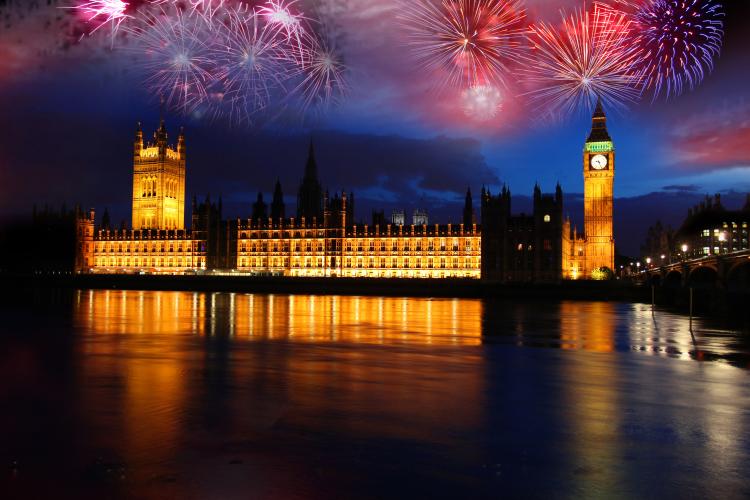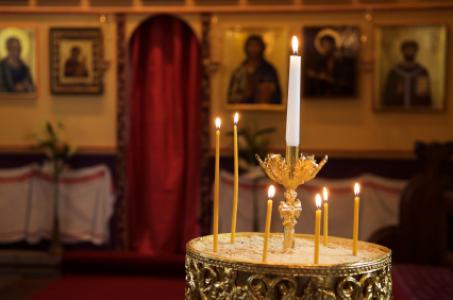
Best Comet of 2025?
C/2024 G3 (ATLAS) has already become very faintly visible to the naked eye for observers in the Southern Hemisphere.
New Year's Day on January 1 marks the beginning of the New Year in the Gregorian calendar. It is a bank holiday in the United Kingdom, where people mark the day with unique customs and traditions.

New Year fireworks behind Big Ben, London.
©iStockphoto.com/extravagantni
The best days to take off work in 2025
3 surprising facts about New Year’s 2025
New Year's Day is a bank holiday, which means it is a non-working day in the United Kingdom.
As with all bank holidays in the United Kingdom, a substitute holiday is declared if New Year's Day falls on a Saturday or Sunday. Usually, this is on the following Monday.
New Year is one of the most widely celebrated holidays in the world. Like in most parts of the globe, New Year festivities in the United Kingdom begin the day before on New Year's Eve on December 31. Around the world, as well as in the UK, people host and attend New Year parties at home or celebrate in restaurants, bars, or on the street, counting down to the end of the year and wishing each other a happy new year with champagne and other sparkling beverages as the clock strikes twelve.
2020 or 2021: When do decades start?
Many cities and towns in the UK celebrate the coming New Year by putting on public firework displays. The city of London has one of the most famous ones. Thousands of people gather at the banks of the river Thames to see an almost 12-minute fireworks display over the London Eye, a giant Ferris wheel. The pyrotechnics begin just after Big Ben chimes midnight and are accompanied by music. Since 2014, this has been a ticketed event.
The fireworks in London are followed by the London New Year's Day Parade, considered to be the largest New Year parade in the world. A 30-year old tradition, the parade began in 1987 as a way to raise money for local charities. Originally called the Lord Mayor of Westminster's Big Parade, the event was renamed in 1994. Parts of the parade route are only accessible to ticketed viewers.
People in Allendale in Northumberland, England, begin their New Year festivities with a fire procession—men carry barrels full of lit tar on their heads across the village before throwing them into a bonfire in the village square.
Hogmanay, the Scottish word for the last day of the year, is a uniquely Scottish custom. The celebrations begin on December 30, with torchlight processions throughout Scotland, with Edinburgh's parade being the biggest and the most popular. On December 31, Scots usher in the New Year by partying and singing Auld Lang Syne, a poem written by Robert Burns, while holding hands with friends and family.
The next day, January 1, folks around Scotland take part in a Loony Dook, an event where costume-wearing people jump into frozen bodies of water to raise money for charity.
Yet another special Scottish New Year tradition is First Footing, where the first guest of the New Year brings gifts that symbolize good fortune, such as black buns, coal, salt, shortbread, and whisky. Traditionally, tall, dark, and handsome men were preferred to be the first-foot in a household.
A unique Scottish New Year tradition is the Fireball Ceremony in Stonehaven. At midnight, about 40 people walk down High Street while swinging flaming balls over the head. The ceremony lasts for about 20 minutes and is followed by fireworks.
In Wales, the New Year was traditionally celebrated by exchanging gifts in an event known as Calennig. Children went from door to door, carrying an apple skewered with sprigs of evergreens and corn and sang songs of health and prosperity in exchange for money or food. Today, this tradition is no longer widely followed, except in a few parts of the region.
People in Gwaun Valley in Pembrokeshire wait for nearly two weeks after January 1 to celebrate their New Year or Hen Galan, which is the first day of the year in the Julian Calendar. On this day, children sing songs while visiting local homes.
New Year is a secular holiday in the UK, so most people celebrate it. Even though employers are not legally obliged to give their employees a day off on January 1, most places of business and work are closed on this day. Many people tend to spend a quiet day with family and friends after attending New Year Eve parties.
New Year’s Day marks the start of a new year according to the Gregorian calendar. It is a relatively modern practice. Although Romans began marking the start of their civil year on January 1 in their calendar (prior to the Gregorian calendar), the traditional springtime opening of the growing season and time for major military campaigns still held on as the popular New Year celebration.
Pope Gregory XIII introduced the Gregorian calendar in 1582. It was adopted immediately in some areas of Europe but wasn't used by many countries until centuries later. The United Kingdom only started observing the Gregorian calendar in 1752, when 11 days were dropped.
Because the UK is a multicultural society, not all people observe New Year’s Day on January 1. For example, the New Year in the Hindu, Chinese, Coptic, Jewish, and Islamic calendars takes place on a different date than in the Gregorian calendar.
| Year | Weekday | Date | Name | Holiday Type | Area |
|---|---|---|---|---|---|
| 2020 | 水曜日 | 1月1日 (水) | New Year's Day | Bank Holiday | |
| 2021 | 金曜日 | 1月1日 (金) | New Year's Day | Bank Holiday | |
| 2022 | 土曜日 | 1月1日 (土) | New Year's Day | Bank Holiday | |
| 2022 | 月曜日 | 1月3日 (月) | New Year's Day observed | Bank Holiday | |
| 2023 | 日曜日 | 1月1日 (日) | New Year's Day | Bank Holiday | |
| 2023 | 月曜日 | 1月2日 (月) | New Year's Day observed | Bank Holiday | |
| 2024 | 月曜日 | 1月1日 (月) | New Year's Day | Bank Holiday | |
| 2025 | 水曜日 | 1月1日 (水) | New Year's Day | Bank Holiday | |
| 2026 | 木曜日 | 1月1日 (木) | New Year's Day | Bank Holiday | |
| 2027 | 金曜日 | 1月1日 (金) | New Year's Day | Bank Holiday | |
| 2028 | 土曜日 | 1月1日 (土) | New Year's Day | Bank Holiday | |
| 2028 | 月曜日 | 1月3日 (月) | New Year's Day observed | Bank Holiday | |
| 2029 | 月曜日 | 1月1日 (月) | New Year's Day | Bank Holiday | |
| 2030 | 火曜日 | 1月1日 (火) | New Year's Day | Bank Holiday |
While we diligently research and update our holiday dates, some of the information in the table above may be preliminary. If you find an error, please let us know.

C/2024 G3 (ATLAS) has already become very faintly visible to the naked eye for observers in the Southern Hemisphere.

January 2 is an annual bank holiday and the last day of the Hogmanay (New Year) celebrations in Scotland.

New Year's Eve, or Hogmanay in Scotland, is the last day of the year in the Gregorian calendar.

Orthodox Christians in the United Kingdom mark the start of a new calendar year on either January 1 or 14 in the Gregorian calendar.